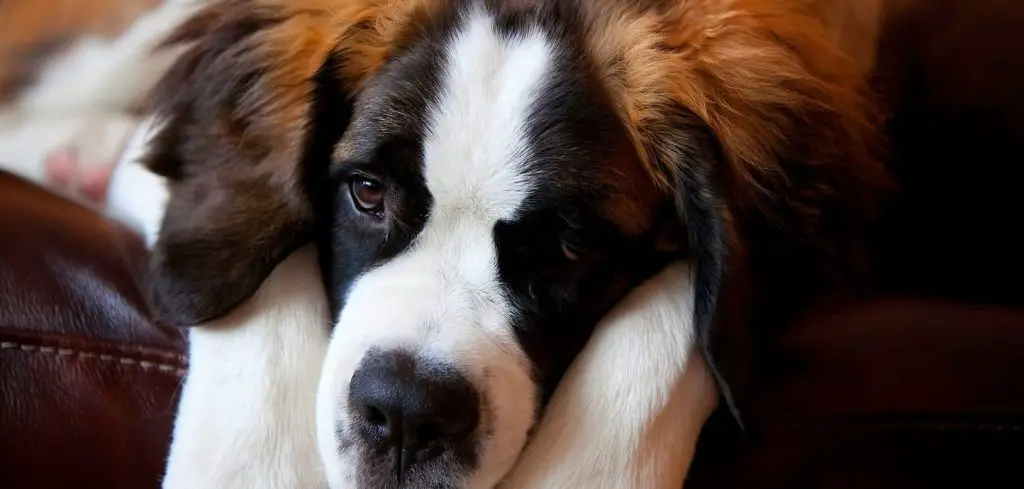It can be alarming to notice your dog sneezing excessively at night, especially if it disrupts their sleep or seems unusual compared to the daytime.
While an occasional sneeze is harmless, frequent sneezing after dark may signal an underlying issue.
We outline the common causes of excessive sneezing in dogs at night, what you can do, and when to seek veterinary help.
Dog Excessive Sneezing at Night — Why It Happens
Excessive sneezing at night in dogs often relates to irritants, allergies, infections, or structural issues in the nasal passages. It can sometimes be triggered by dust or bedding allergens, while in other cases it may point to conditions like nasal mites or even dental disease that worsens when a dog is lying down.
Some breeds with shorter snouts, such as Bulldogs or Pugs, may also be prone to nighttime sneezing because of restricted airways.

Excessive Sneezing in Dogs at Night: Common Causes
Allergies
Allergies are one of the most frequent reasons dogs sneeze more at night. Dust, pollen, mold spores, or even laundry detergents used on bedding can irritate a dog’s nasal passages.
When a dog settles down for sleep, close contact with fabrics or carpet fibers may trigger symptoms. You might notice watery eyes, runny nose, or itchiness alongside sneezing.
Nighttime allergies are not only uncomfortable but can disturb your dog’s rest and overall well-being.
Related: Dog Excessive Urination at Night (Here’s why)
Environmental Irritants
Sometimes, sneezing is caused by environmental irritants that become more concentrated indoors at night. Air fresheners, scented candles, cleaning products, or smoke can irritate the sensitive lining of the nasal passages.
Dogs have a much stronger sense of smell than humans, so even faint odors may lead to repetitive sneezing.
In small or poorly ventilated spaces, these triggers can become overwhelming, especially when dogs spend hours lying still and breathing deeply.
Nasal Mites
Microscopic parasites called nasal mites can cause persistent sneezing, snorting, and nasal discharge, often worsening at night when a dog is at rest.
These mites are contagious and spread between dogs, making them more common in multi-pet households or social environments like dog parks.
In addition to sneezing, you may see pawing at the face, reverse sneezing, or even nosebleeds. Left untreated, nasal mites can lead to chronic irritation and secondary infections.
Respiratory Infections
Infections of the upper respiratory tract, such as kennel cough or viral colds, can also make dogs sneeze more often at night.
The inflammation and mucus buildup worsen when a dog lies down, making breathing harder and sneezing more frequent.
Signs often include coughing, nasal discharge, reduced appetite, and fatigue. While mild infections may resolve on their own, others require veterinary care to prevent complications like pneumonia.
Foreign Objects
Sometimes a dog sneezes excessively because of a foreign object lodged in the nasal passages. Small items such as grass seeds, foxtails, or even dust particles can become trapped.
These objects irritate the nasal lining and trigger violent sneezing fits, especially noticeable at night when the dog is lying still.
In some cases, blood may appear in the discharge. Foreign bodies always require prompt veterinary attention, as they rarely clear on their own.
Dental Disease
Tooth infections or abscesses in the upper jaw can extend into the nasal cavity, leading to chronic sneezing. This is particularly common in older dogs or breeds prone to dental issues.
At night, when your dog is resting, the discomfort may become more obvious, resulting in sneezing fits. You may notice bad breath, difficulty chewing, or pawing at the mouth. Left untreated, dental disease can cause severe pain and systemic illness.
What to Do If Your Dog Is Sneezing Excessively at Night
If your dog sneezes at night, first try to identify any environmental triggers. Wash their bedding with unscented detergent, vacuum frequently, and keep the sleeping area dust-free. Avoid air fresheners, candles, or strong cleaning products near where they rest.
For dogs with suspected allergies, providing a HEPA air purifier in the bedroom may reduce airborne particles. Keeping windows closed during high-pollen seasons can also help.
Make sure your dog stays well-hydrated, as dry nasal passages can worsen sneezing. A humidifier in the room may ease irritation if the air is dry. For mild infections, rest and supportive care may be enough, but monitor closely for worsening symptoms.
While some sneezing can be monitored at home, persistent or worsening sneezing should always be discussed with a veterinarian to rule out serious conditions.
When to Call or Visit Your Vet
You should seek veterinary advice if your dog’s nighttime sneezing is accompanied by nosebleeds, thick discharge, or visible discomfort. These could point to infection, nasal mites, or even growths in the nasal cavity.
Contact your vet promptly if your dog also has a cough, loss of appetite, lethargy, or breathing difficulty. Sneezing that does not improve within a few days, or appears suddenly and severely, should never be ignored.
Foreign objects in the nose, dental abscesses, or recurring respiratory infections always require professional care. Early treatment helps prevent complications and restores your dog’s comfort quickly.
Read more: Dog Excessive Swallowing at Night (What it means for their health)
Key Takeaway
Excessive sneezing at night in dogs can stem from simple issues like allergies or irritants, but it may also indicate infections, parasites, or dental problems.
Paying attention to when and how often the sneezing occurs helps guide whether it can be managed at home or needs veterinary attention.
By keeping the sleeping area clean, minimizing irritants, and monitoring your dog’s overall health, you can often reduce nighttime sneezing.
But when in doubt, consulting your veterinarian ensures your dog receives the right care and enjoys peaceful, comfortable nights.
